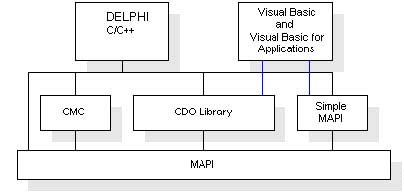|
|
|
|
|
|
| Home | Development | Partners | Resellers | About |
 |
MAPI - CDO Address Book Sample Performance Tests This is a sample application, that demonstrates MAPI/CDO differences and performance. Differences Between CDO, Simple MAPI, and Extended MAPI (according Microsoft) MAPI (Messaging Application Programming Interface) A messaging architecture and a client interface component. As a messaging architecture, MAPI enables multiple applications to interact with multiple messaging systems across a variety of hardware platforms. As a client interface component, MAPI is the complete set of functions and object-oriented interfaces that forms the foundation for the MAPI subsystem's client application and service provider interfaces. In comparison with Simple MAPI, Common Messaging Calls (CMC), and the Active Messaging Library (CDO), MAPI provides the highest performance and greatest degree of control to messaging-based applications and service providers. CDO Microsoft® Collaboration Data Objects A technology for building messaging or collaboration applications. Also called OLE Messaging; in version 1.1 it was called Active Messaging. It is designed to simplify the creation of applications with messaging functionality, or to add messaging functionality to existing applications. CDO is MAPI shell, or in other word, CDO does not represent a new messaging model, but rather an additional scripting interface to the Messaging Application Programming Interface (MAPI) model. The following figure shows the CDO Library as a layer that is built on top of MAPI. This is similar to the way function calls to the Common Messaging Calls (CMC) interface are mapped to the underlying MAPI interfaces.  It is important to recognize that the CDO Library does not offer access to all of the features of MAPI. In particular, it is designed primarily for clients and is not suitable for service providers. It is important to recognize that the CDO Library does not offer access to all of the features of MAPI. In particular, it is designed primarily for clients and is not suitable for service providers.
The following table summarizes the programming interfaces that Microsoft provides for MAPI.
MAPI - CDO Address Book Application, only enumerate (count) recipients on Global Address Book (Microsoft Exchange Server GAL). The following table summarizes result:
** Tested with: CPU 1 - Genuine Intel x86 Family 5 Model 4 Stepping 3 ~233 MHz (Pentium 233 MMX) System BIOS - Award Modular BIOS v4.51P Total Physical Memory - 163256 KB (160MB) OS Type - Microsoft (R) Windows NT (TM) Server Version - Version 4.0 (Build 1381: Service Pack 6) CPU/OS Processes - 49 Microsoft Exchange Server Version 5.5 (Build 2650.24: Service Pack 3) DELPHI Version 5.0 (Build 5.62) Compiled Application: MAPICDOExe.zip For more information, please write |
|
||||||||||||||||||||||||||||||||||||||||
Copyright © 2021 IMIBO
Privacy Statement |